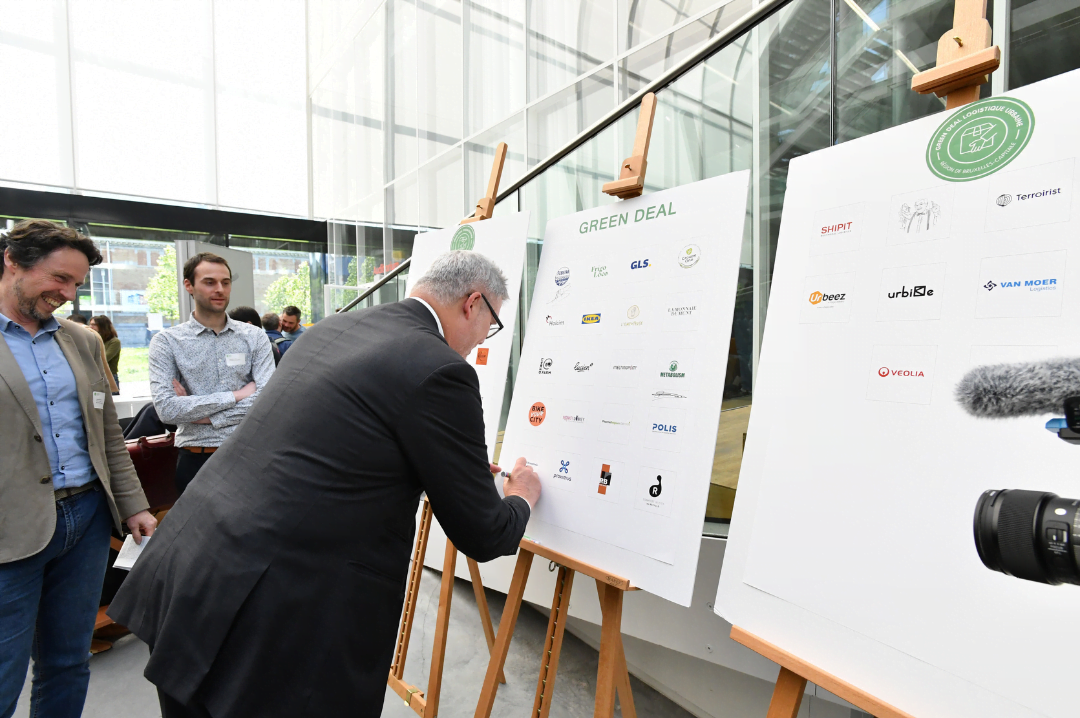A Good, Green Deal
On 19 April 2023, a unique coalition of 50 public and private participants signed the Green Deal for Sustainable Logistics to promote sustainable logistics in Brussels. This initiative aims to make Brussels' logistics more efficient and emission-free by 2025.
Efficient and emission-free logistics are essential for the smooth functioning of cities, however, it also has a significant impact on the well-being of city dwellers. Each day more than 16,000 lorries and 30,000 vans enter the Brussels-Capital Region to transport goods. These transport flows are essential to the smooth running of the Region: it is estimated that each inhabitant generates around 40 tons of transported goods per year.
Why the logistics sector?
These journeys are also the source of numerous nuisances: air pollution, greenhouse gas emissions, congestion, and road safety problems. It is estimated, for example, that in 2020, goods transport in the Brussels-Capital Region (vans and lorries in circulation) represented only 17% of all kilometres travelled but was nevertheless responsible for 41% of nitrogen oxide (NOx) emissions and 30% of fine particle (PM2.5) emissions and 29% of transport-related CO2 emissions.

Brussels Canal. Credit: Port of Brussels
Furthermore, this sector has been facing several changes in the last few years, such as new technologies and delivery methods, as well as economic, environmental, and social challenges that must be addressed. Therefore, making urban logistics more sustainable is an integral part of the Region’s ambition regarding mobility, environment and sustainable development.
Towards more efficient logistics with no direct emissions in the capital
To address these challenges, the Brussels-Capital Region has established an unprecedented alliance of some 50 ambitious players: the ‘Green Deal Urban Logistics.’ These companies originating from both the public and the private sector include one-man businesses as well as international companies and demonstrate the economic diversity of the Region (e.g. actors from construction, retail, transport, and sustainable food industries). Each and every one of these organisations has committed to taking transformational measures, making urban logistics more efficient and, above all, sustainable. The Green Deal aligns with the region's Zero Emission Roadmap, adopted in June 2022.

Signature of the Green Deal Urban Logistics. Credit: Yannick Coppens, SPRB-GOB
This Green Deal will be achieved through the implementation of measures determined by the involved organisations themselves. On the one hand, these measures must be ambitious by aiming at a faster transition than the decarbonisation trajectory of the Brussels-Capital Region (in particular the Low Emission Zone timeline). They should be on the other hand achievable before 2025 to keep a short-term horizon for the implementation of actions of the Green Deal. To identify the measures that members of the Green Deal can implement to make their logistics more sustainable, the framework of the 4 A's is used to explore their possible commitment. Measures can therefore contribute to one of the following in terms of sustainable city distribution:
- Awareness: making all actors in urban logistics aware of the impacts of transport and the need to change their practices to reduce emissions.
- Avoidance: reducing transport demand by optimising delivery volumes and routes, and thus heavy vehicle traffic.
- Act and shift: transition to other modes of transport such as shipping, rail and cargo bikes.
- Anticipation of new technologies: replacement of vehicle engines with no direct emissions systems.
A living community
 A first assessment of the participants' achievements will be made in 2025 before launching a new round of commitments to be implemented by 2027, and then again between 2027 and 2030. The public partners of this alliance will put in place financial and technical support measures to support the actions of the private partners. In addition to networking, they will organize information-sharing and awareness-raising events such as workshops and field visits.
A first assessment of the participants' achievements will be made in 2025 before launching a new round of commitments to be implemented by 2027, and then again between 2027 and 2030. The public partners of this alliance will put in place financial and technical support measures to support the actions of the private partners. In addition to networking, they will organize information-sharing and awareness-raising events such as workshops and field visits.
Bloomberg Philanthropies will support a call for projects targeting signatory companies and focusing on collaborative projects to encourage players who don’t necessarily work together to join forces and push innovation further.
The Brussels-Capital Region is delighted with the successful launch of this logistics Green Deal. A dozen new companies have already expressed their interest in joining the Green Deal community, which will probably grow larger as the project progresses. The Brussels-Capital Region will encourage exchanges with other European cities and regions that have established similar initiatives to lead this great adventure and ensure that the experience of participating in the Green Deal is as beneficial as possible for the signatories.

Signatories of the Green Deal Urban Logistics. Credit: Yannick Coppens, SPRB-GOB
Click here to read the article in its original format.
About the authors:
Simon Dehouck helps Brussels-based companies transition towards more sustainable mobility practices. He has significant experience in supporting companies in developing their mobility plans. Currently, he is coordinating the Green Deal Urban Logistics. He also has a strong interest in mobility data management and visualisation.
Charlotte Debroux has professional and research experience for over 25 years in transport systems management and optimisation. Heavily involved in supporting policy formulation, implementation and policy assessment for sustainable mobility, she has good knowledge of the city’s challenges and of techniques for managing the change towards implementation of new mobility schemes.
